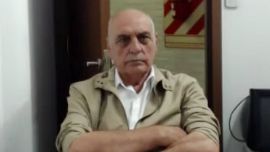Argentina’s government will need “substantial debt relief” from private creditors as the coronavirus pandemic and its economic impact exacerbates the country’s financial situation, IMF chief Kristalina Georgieva said Friday.
The nation already had been dealing with an economic crisis and Georgieva said “tackling these issues has become even more pressing in light of the coronavirus pandemic and its significant health and economic impact.”
IMF staff “analysis shows that considering this debt-carrying capacity, and the existing debt burden, a substantial debt relief from Argentina’s private creditors will be needed to restore debt sustainability with high probability.”
President Alberto Fernández’s government last week finalised a proposal to restructure some US$69 billion of the country’s massive public debt, hoping to delay the maturity of some institutional loans and reduce the amount owed to private creditors.
Since taking office in December, the government has insisted it will not be able to pay off its creditors if its recession-hit economy fails to resume growth.
The IMF staff was blunt in its assessment.
“Argentina’s public debt, which stood at near 90 percent of GDP at end-2019, is unsustainable,” the technical analysis warned. And getting public finances to a level where it could manage the debt “is not economically or politically feasible.”
The country is struggling with inflation of more than 50 percent, a major currency depreciation and a poverty level that has soared almost to almost half the population after nearly two years of economic downturn.
In 2001, Argentina defaulted on payments on nearly US$100 billion of its external debt, but has since paid some back in the form of large swaps.
Argentina currently owes US$311 billion with more than US$30 billion in repayments due before the end of March.
The overall debt includes US$44 billion outstanding from a deeply unpopular US$57 billion IMF bailout negotiated by former president Mauricio Macri in 2018.
The Fund has itself come in for criticism for repeatedly coming to the rescue of a country that has faced serial financial crises.
Georgieva said the IMF’s “priority is and remains helping support Argentina’s recovery with a particular focus on those that have the least and are most exposed. Ultimately, our objective is to pave the way for a stable and prosperous economy.”
In the midst of the delicate debt restructuring, the government is holding its breath as the coronavirus pandemic, coupled with an oil price slump, poses a perfect storm for the economy.
Plunging global oil prices have also raised fresh concerns over the viability of the government plan to exploit the huge Vaca Muerta shale reserves in Patagonia – a cornerstone of the Peronist leader’s plan to boost revenue.
Vaca Muerta’s shale oil and gas deposit is considered among the world’s largest.
Extraction began in 2013, but even with some 20 companies operating there – including Chevron, Shell, Total and Statoil – development has largely stalled, with barely five percent of the reserves being exploited, according to analyst Alejandro Einstoss.
As it stands, Vaca Muerta plays an important role in the domestic market, supplying three percent of the country’s gas needs and 19 percent of its oil.
Production Development Minister Matías Kulfas has insisted that “the oil companies’ interest in Vaca Muerta is still intact, despite the crisis.”
However, with oil now hovering as low as US$30 a barrel and shale remaining expensive to exploit, the market is currently unfavourable to development of Vaca Muerta.
– TIMES/AFP























Comments